
The Daily Agenda: Single-shot themselves in the foot?
We're going even more digital! … Each volunteer has 10 fingers to count on … And smile, you're on Instagram.
Democrats say next year is the year they’ll take control of the Legislature. But they’ve been saying that for a long time.
Last year, Democrats forfeited the opportunity to take the majority in the state House by running only six candidates for the state’s 10 competitive seats. Even if all six of the candidates had won, Democrats still would have only tied the House, not taken the majority.
That’s thanks to Democrats’ enduring strategy of the single shot: running only one candidate in a race for two House seats in competitive legislative districts.
The tactic has allowed Democrats to pick up unlikely wins in competitive but Republican-leaning districts over the years. But it also meant they gave up potential wins that could have put them in the majority this year.
It’s a pretty controversial strategy.
“It’s difficult to see how you will win a majority when you don’t even field enough candidates in the races that could get you there,” as Republic columnist Laurie Roberts put it last year. “If there is such a thing as political malpractice, this is it.”
And in 2024, Democrats are once again leaning into single-shot candidates in several House races, per Democratic Sen. Priya Sundareshan, chair of the Arizona Democratic Legislative Campaign Committee.
But after taking a cautious approach in what turned out to be a surprisingly good mid-term election for Democrats, the party is going to rely on it less in 2024.
Next year, Democrats are hoping to run (at least) seven candidates for the state’s 10 competitive state House seats, which would put the majority just within reach, assuming a few other things go right for them.
The single-shot strategy requires tact and coordination. But it can help a single candidate overcome a district’s partisan disadvantage.
It works like this: Democrats tell their party faithful to vote for just the one Democrat and nobody else. They ask independent-leaning voters to vote for the Democrat and one of the Republicans.
If enough people do that, it can increase the Democrat’s share of the vote, lifting them to a second-slot victory.
The single-shot strategy has proven to be a good way for the Democrats to get a toehold in red districts. Sen. Mitzi Epstein lost her single-shot race for the House in 2014 but got elected in 2016 with the same methodology. By 2018, her district had a full blue slate of state legislators.
Last year, newcomer Rep. Keith Seaman campaigned as a single-shot Democratic candidate in a Republican-leaning district. He knocked on doors and asked for Republicans’ and Independents’ second votes while emphasizing his Veteran status to appeal to rural voters. He barely clinched a House seat, beating Republican Rob Hudelson by about 600 votes to join Republican Rep. Teresa Martinez in representing the two House seats in Pinal County’s Legislative District 16.
In fact, the single-shot strategy works so well that Democrats won a House seat in all four competitive races where they single-shotted a candidate in a Republican-leaning district. Then again, it was a good year for Democrats, and in the one competitive district where they ran two candidates, both won.
If they had gambled with two candidates in at least one of those races, the House may be in the tie the party vied for.1
In the Chandler-based LD13, the state’s most competitive district, Democratic Rep. Jennifer Pawlik ran as a single-shot candidate last year. She was the top vote-getter, and some suggest with a running mate, Democrats would have won half the House.
But hindsight’s 20-20.
Sundareshan, who supports the single-shot strategy, said Democrats will likely once again stick with the single-shot strategy, except in one additional district, she said.
That will give Democrats a viable, if narrow, path to the majority in the House.
Pawlik decided not to seek re-election next year in her uber-competitive LD13, and Democrats plan to run two candidates for the district’s two seats. Democrats Brandy Reese and Shante Saulsberry have already filed statements of interest. Republicans aren’t content to protect their one seat. Former Republican lawmaker Jeff Weninger is trying to win back the district’s other seat alongside Republican Rep. Julie Willoughby.
But the single shot will still be a big part of Democrats’ upcoming election strategy.
Democrats plan to run only one House candidate for the two seats in the north Phoenix-based LD2. The goal is to put Stephanie Simacek, a Deer Valley Unified School District Governing Board member, in the seat currently held by Democratic Rep. Judy Schwiebert, who is seeking the district’s Senate seat.
The Democratic Party also plans to single-shot local real estate developer Kevin Volk in Pima County’s LD17, a right-leaning district that’s not considered competitive. But Republicans narrowly took both of the district’s House seats last year, when Democrats failed to run a single-shot candidate for the district.
They’re hoping this year they can pick up a House seat by focusing on just one candidate.
Republicans can use the single-shot strategy, too, of course. But they rarely do.
That’s in part because Republicans see less need to run a single-shot gamble in competitive districts, which mostly lean Republican.
Anyway, there’s nothing a party can do to stop a candidate who’s determined to run for office under their banner. And while Democrats tend to enforce more strategic discipline in their ranks, Republican campaigns are more grassroots affairs.
In one of the rare recent examples, Republican Rep. Michele Peña ran as a write-in in the 2022 primary election in the Yuma-based LD23, where Democrats have a strong advantage. But through the power of the single-shot vote, she narrowly defeated the district’s second Democratic nominee, Jesus Lugo Jr., to flip the blue seat.
Republicans, meanwhile, have a harder time clearing the field for a single shot — even to support incumbents. In Paradise Valley’s LD4, Republican Rep. Matt Gress already has at least one GOP companion seeking the ballot, while Democratic Rep. Laura Terech is so far running alone. In Pinal County’s LD16, there’s already a five-way GOP primary for the two seats, while Seaman is running alone.
Even Peña, the unlikely victor in Yuma’s safe Democratic district, doesn’t get a free ride. Although keeping other Republican candidates out of the race and single-shotting Peña might help her hang on to her difficult re-election bid, that’s probably not gonna happen.
Already, another Republican has filed a statement of interest to join her on the campaign trail for the district’s two House seats.
Our goal at the Arizona Agenda and Tucson Agenda is to make politics and government accessible to everyone.
And that means we want to meet you where you are, in formats that resonate with you.
The 2024 election is coming up fast, and we are overflowing with ideas for covering it through new formats and platforms. We want to build a podcast, make videos for TikTok and YouTube, and find new ways to tell our stories and reach people through Instagram, Facebook and virtual meet-ups.
But we don’t have the bandwidth to pull it all off alone. We need your help to bring these visions to life.
So in the spirit of Giving Tuesday, we’re asking for your support to hire a part-time digital storyteller who can produce podcasts and short videos, and craft engaging narratives on our social platforms.
Your donations are tax-deductible, thanks to our partners at the Local Media Foundation, a 501(c)(3) non-profit organization that allows independent and family-owned news organizations to solicit tax-deductible donations from their communities for journalism projects.
Hiring isn’t cheap. We’re hoping to raise above $30,000 between now and the end of the year to buy equipment and support a part-time position next year so that we can take the kinds of stories we’re already telling and adapt them to new formats and reach more voters.
You already saw some of that in today’s short video explainer of how the single-shot strategy works. Still not convinced? Watch this low-budget short video Curt and Hank put together to pitch the whole idea!
Our fundraising campaign will run through the end of the year, but don’t delay!
The sooner we raise the money, the sooner our digital storyteller can get to work.
Hand count fever spreads: Mohave County supervisors plan to vote today on whether to hand-count their election results, without machines, per Votebeat’s Jen Fifield. That is almost certainly illegal, despite what soon-to-be-disbarred attorney Bryan Blehm told the board in a letter urging them to do it and promising to represent them via private donors. Blehm’s legal representation didn’t help the two Cochise County supervisors who are now facing a criminal investigation for attempting to hand-count ballots and refusing to certify their county’s election last year. Meanwhile, Pinal County Attorney Kent Volkmer is trying to warn his supervisors not to go down the same path, per Pinal Central’s Mark Cowling.
“(Y)ou’ll be sued, you will lose, and I believe the Attorney General’s Office in all likelihood would bring criminal charges,” Volkmer told the board during last week’s debate over hand-counting. “Because there’s no longer that good faith claim that ‘Well, I didn’t really know.’ We now have the (appeals court) opinion that’s very clear.”
No recount fever: Tucson officials claim that a new state law requiring more recounts of close races doesn’t apply to the city’s Prop 413, which would dramatically increase the mayor and council’s pay. The law seems pretty clearly designed to apply to local referrals, as the Tucson Sentinel’s Dylan Smith notes, and the margin of victory is within the recount threshold.
There’s intelligence and there’s savvy: Arizona Senate President Warren Petersen, a housing developer, wants to eliminate the state’s protections against developing housing in certain areas without a 100-year supply of water, which is at the heart of the 1980 Groundwater Management Act, Capitol scribe Howie Fischer reports. In other water news, Phoenix is now using artificial intelligence to test its sewage water for all sorts of things, including signs of illegal dumping, per Cronkite News’ Ellie Willard. But be careful of AI voice scams, Democratic U.S. Sen. Mark Kelly is warning, after an Arizona woman almost got tricked out of $50,000 by an AI-generated impression of her daughter’s voice.
She did it: Democratic U.S. Rep. Greg Stanton told on his wife for buying individual stocks, which isn’t illegal but which Stanton has tried to make illegal. He disclosed in financial documents that she had received them as a result of a new job and he immediately sold them at a loss when he found out, per the Republic’s Laura Gersony.
Gov. Katie Hobbs doesn’t want to bail out the University of Arizona from its surprise financial crisis and seems pretty annoyed that it was a surprise, per Axios Phoenix’s Jeremy Duda. She wants the university to figure it out themselves but isn’t a fan of its plan to cut student financial aid to make up the difference.
"I'm concerned about the fact that this sort of just happened and there hasn't been a lot of oversight,” Hobbs said. “And I think right now the priority is getting to the bottom and finding out what happened and what can be done to make sure they're on solid fiscal ground."
Someone recently sent us this Instagram post from a Texas-based teeth-whitening shop featuring a bright, white smile from a satisfied customer.
We would never laugh at Republican Arizona state Rep. Austin Smith for trying to look his best.
But as a public figure, he should have the good sense to say no when the whitening shop asks for a photo afterward! It’s not like Donald Trump does free promos for his tanning bed shop.
Democrats didn’t employ the single-shot strategy in Mesa’s LD9, which is the most Democratic-leaning of the five competitive districts, and won both seats. Democrats would have tied the House this year, having won all of the competitive seats they actually contested, except they lost a “safe” Democratic seat to Peña in Yuma.





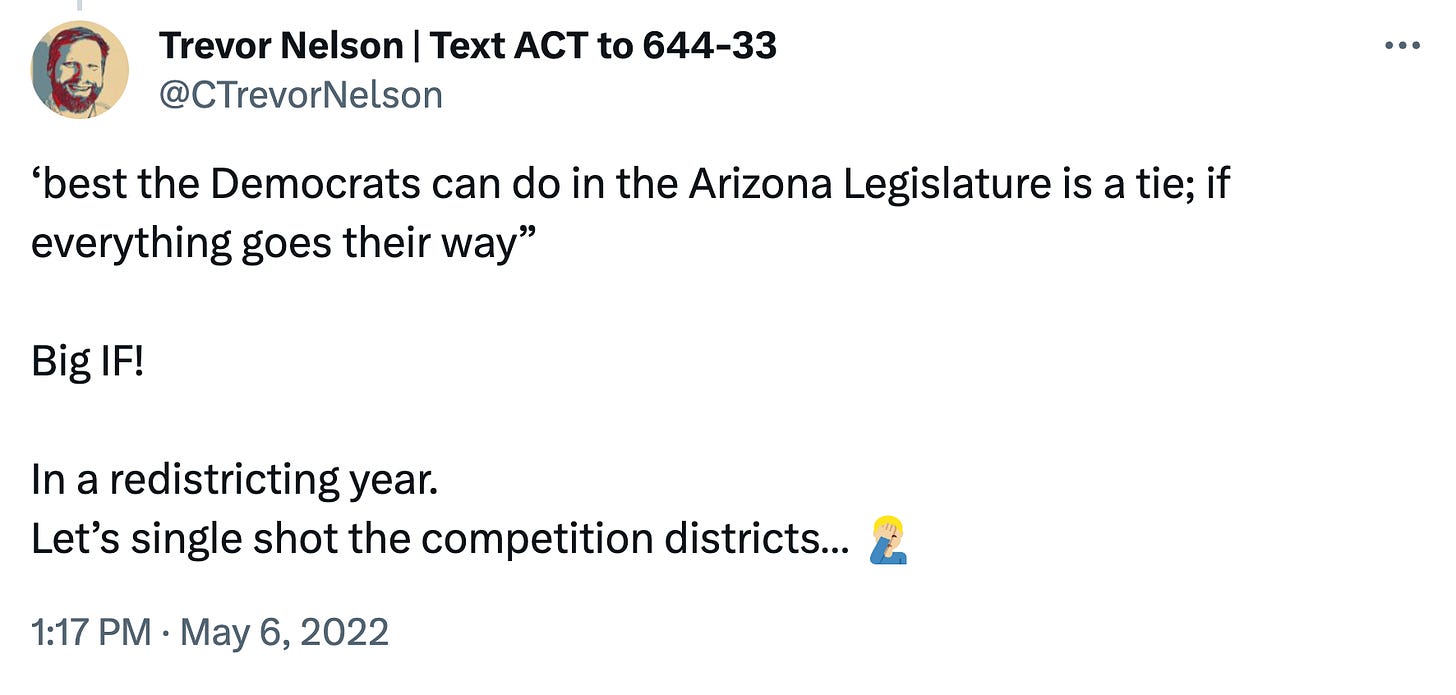
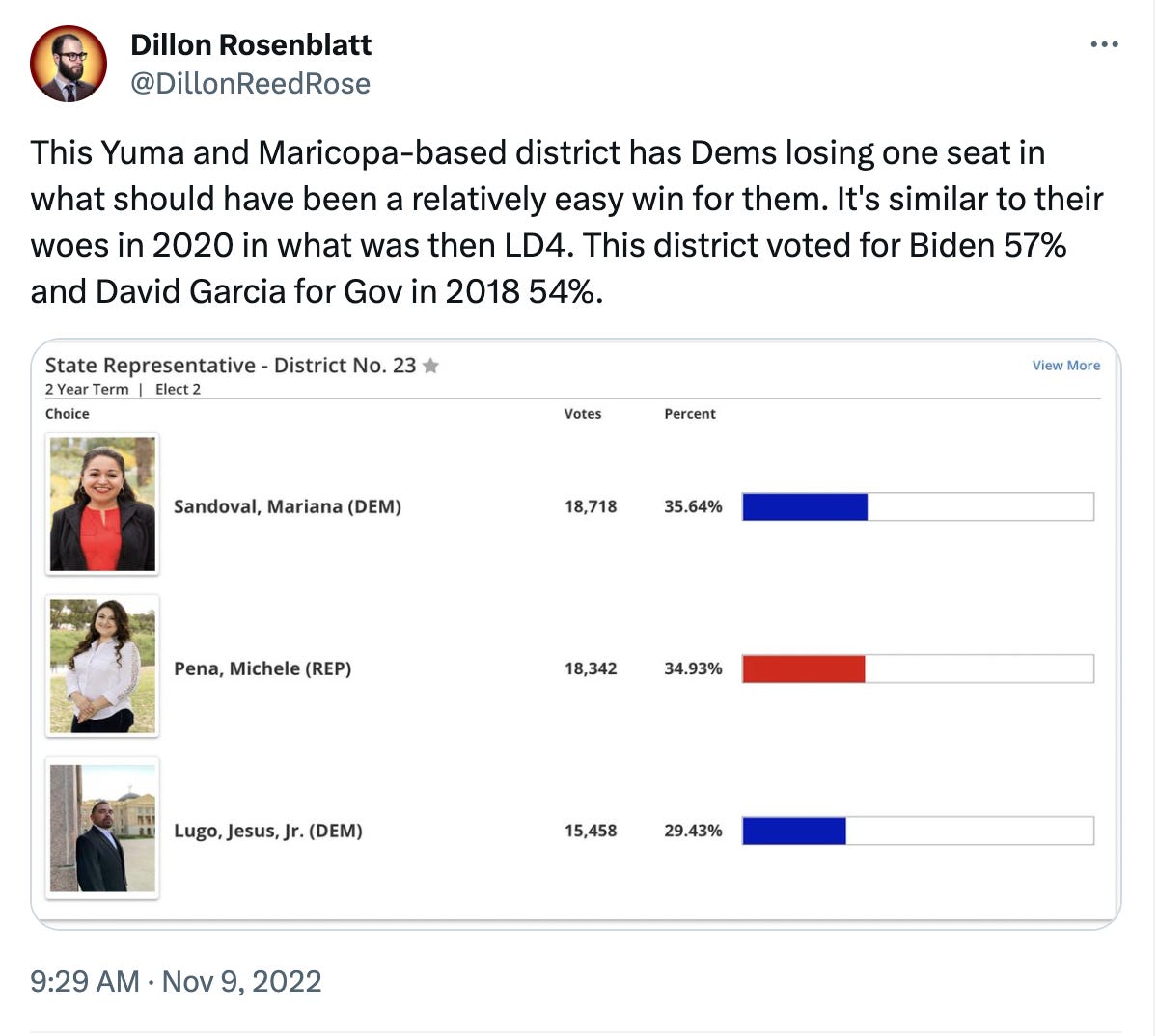


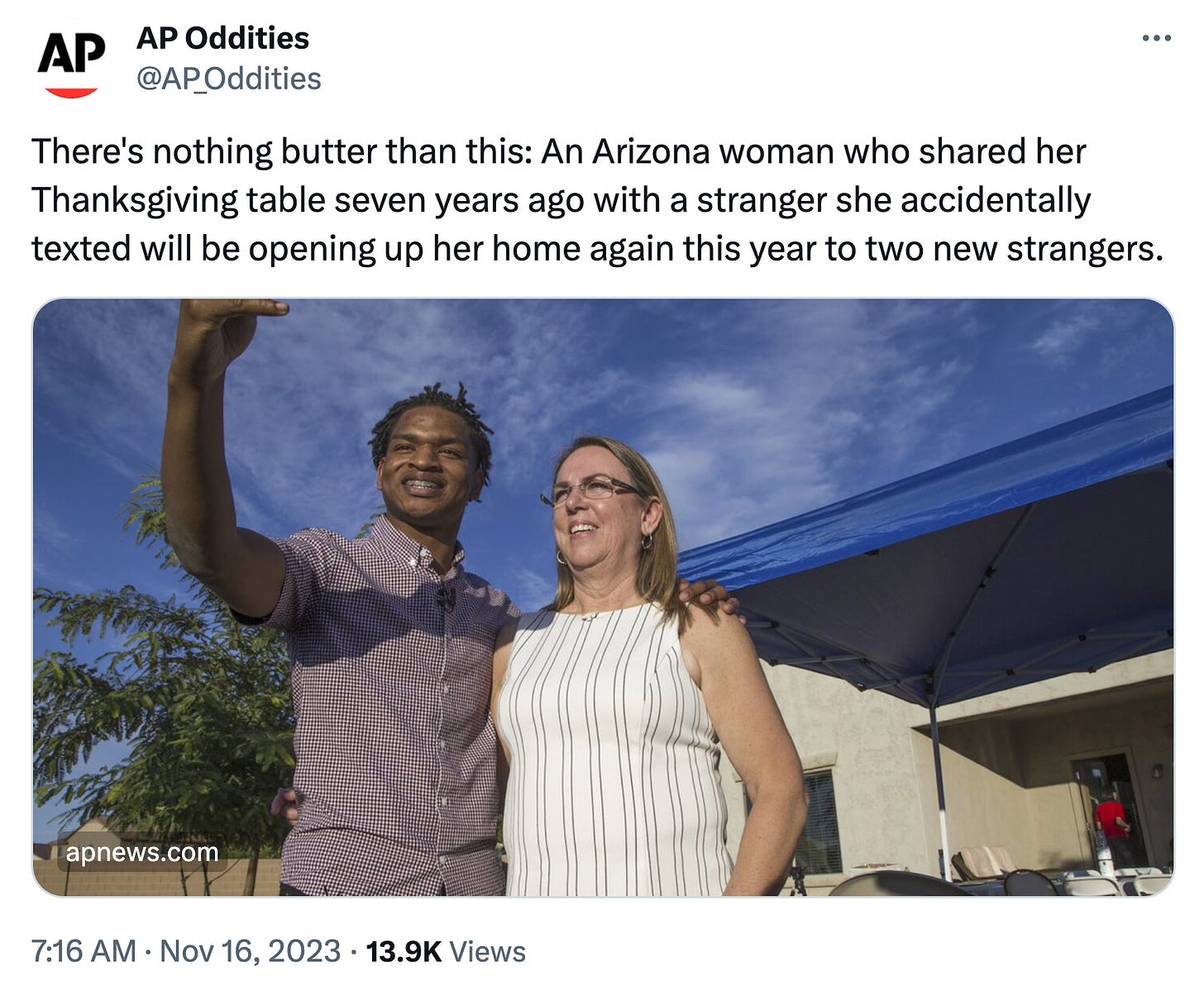








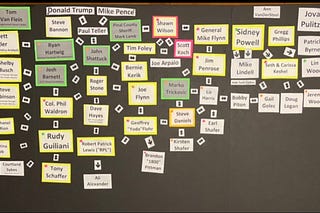

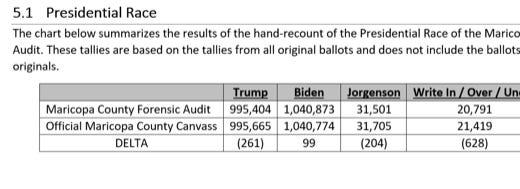

Correction: in the Arizona House, hindsight is 30-30.
Glad to see y'all branching out. The folks reading the newsletter, I'm guessing, probably skew toward the more engaged and informed. Trying to reach out to younger generations and help them better understand the local issues that impact them most is important work.
If you haven't already, check out the Handshake hiring platform to recruit university students.